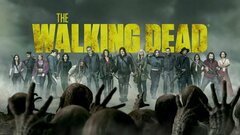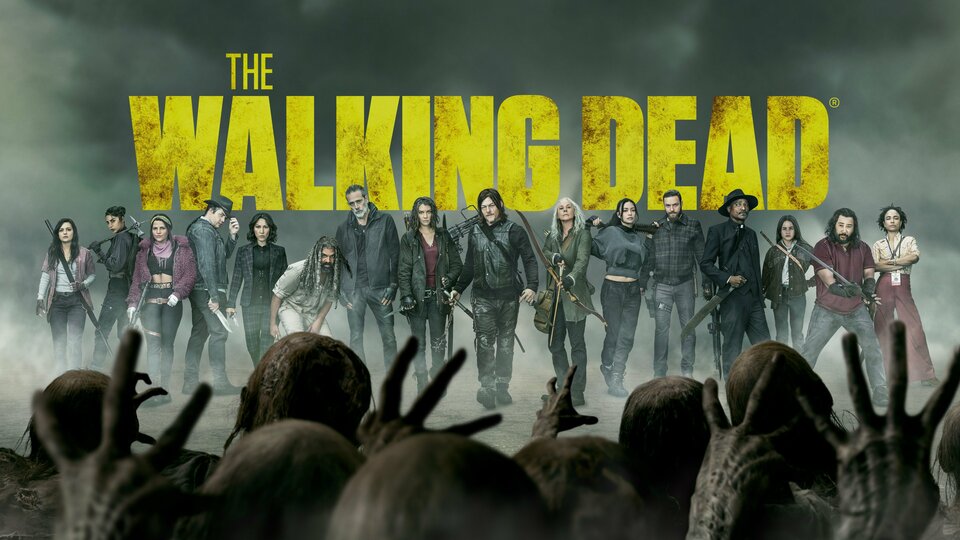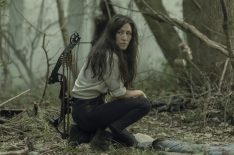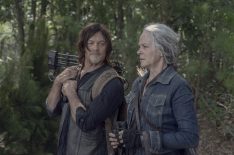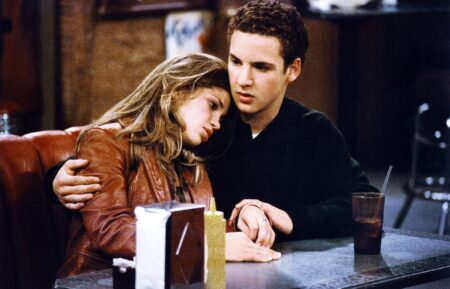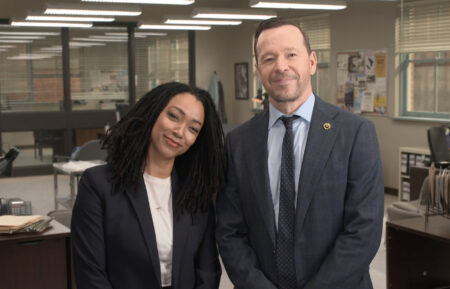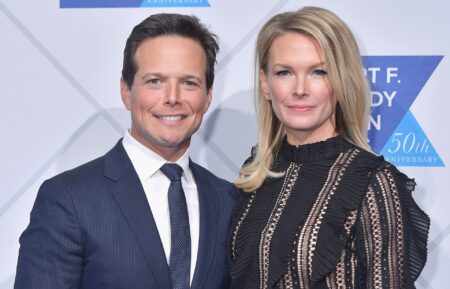‘The Walking Dead’ Star Avi Nash Breaks Down Siddiq’s ‘Tragic’ Episode
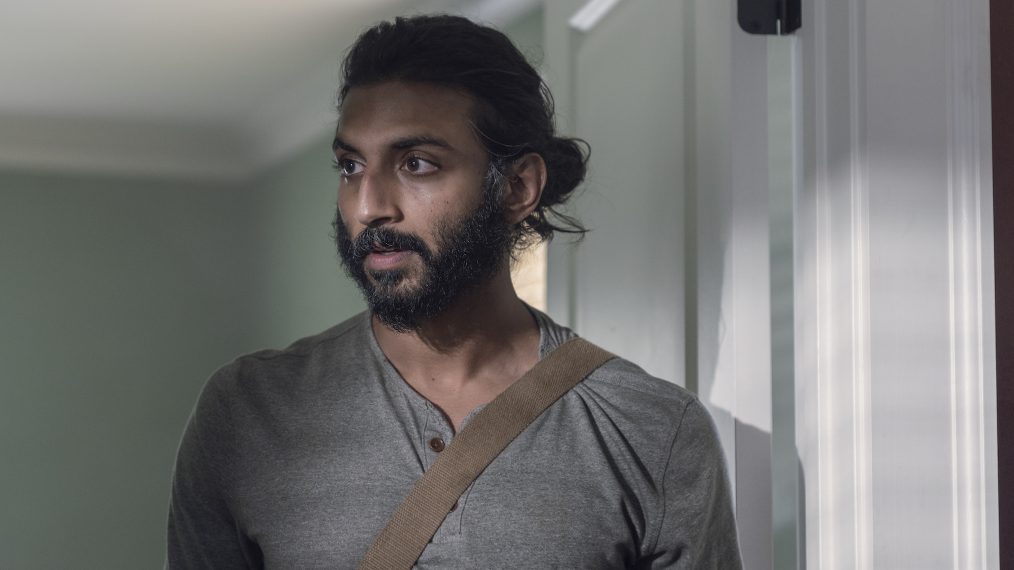
Spoiler Alert
[WARNING: The following contains MAJOR spoilers for The Walking Dead Season 10 Episode 7, “Open Your Eyes.”]
“Open Your Eyes” continued a pattern fans of The Walking Dead have seen reoccur on the show for years: Being a doctor in the zombie apocalypse is a death sentence.
While Siddiq made it longer than most in his post-apocalyptic profession (Milton Mamet, Caleb Submaranian, Harlan Carson, Denise Cloyd and poor Enid weren’t so lucky), his loss is tragic on several levels. Sure, he was yet another doctor who bit the dust, but he was a doctor who was grappling with his demons — and just as he was about to emerge from their clutches, he was killed. Dammit, Dante!
We chatted with Avi Nash about Siddiq’s untimely demise, the connection between Siddiq and spiders and whether Alexandria just lost its only doctor.
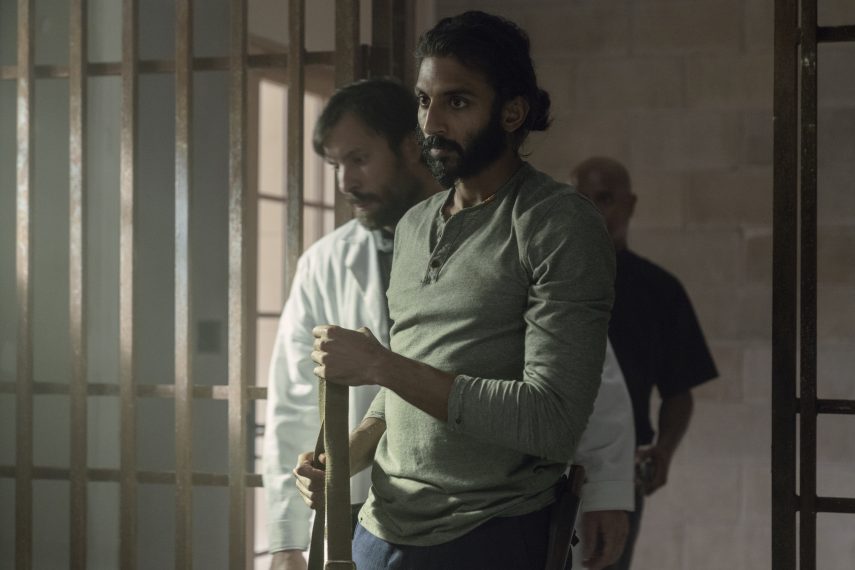
Some fans might be wondering after the end of the episode, so I wanted to clarify: Is Siddiq really, truly, 100% dead?
Avi Nash: Yeah, he is. As dead as they come.
When and how did you find out that he was going to be killed off the show, and how did you react?
Angela called me up before the season began. We started to get into some of the character arc of Siddiq this year, and she told me this was going to be his swan song. Rather than being sad about it, we were both passionate about the complexity of what he was going through with being a new father, and PTSD, and honoring the Grimes family and eight years of his story. For me as an actor, the most important thing is always to serve the story in a beautiful way, and I think as tragic as it might be, his death does that. I knew about it early, and I was ready to start all my PTSD research.
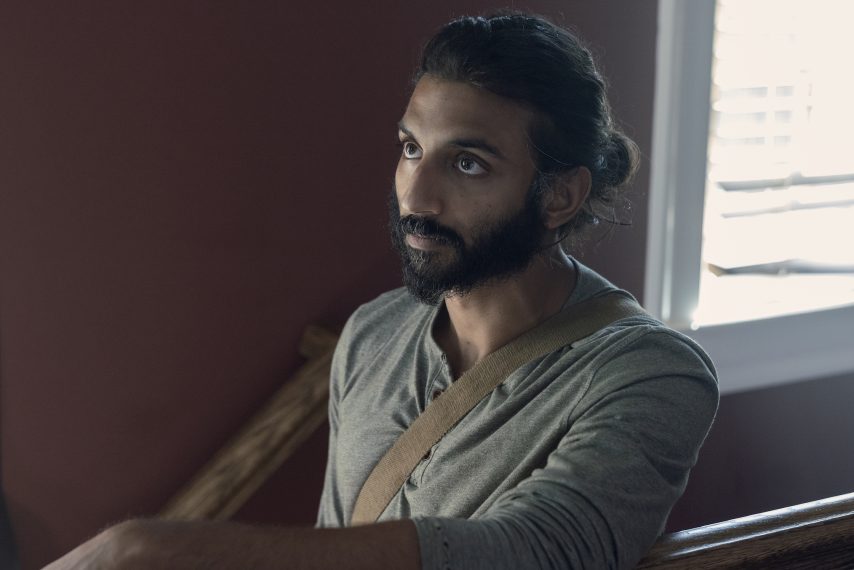
That was something else I wanted to talk with you about. I really enjoyed Siddiq’s storyline, because it’s rare to see mental health struggles and PTSD portrayed on TV. How did you feel about tackling such a huge topic with your character?
For me, it was really important to be sensitive to the topic and not continue some of the depictions we often see on-screen of the “angry vet.” That’s not false regarding what it is to have PTSD, but I think it can be more nuanced and more complex. When you have to portray something that’s important to a lot of people and can help facilitate the discussion of a debilitating condition, I wanted to make sure I was prepared. There are a couple of good books out there; one by Karl Marlantes called “What it’s Like to Go to War,” and one by the leading psychologist on PTSD called “The Body Holds the Trauma.” I delved into those and got my imagination started on what it’s like to live with this condition.
For Angela, myself and the other writers, it was important to embrace the complexity of PTSD, which is not just fits of anger. It’s a constant state of terror, because your memory no longer exists in the past. The trauma you go through is so terrible and powerful that it doesn’t have an end point, and there’s a physical change in your brain that forces this memory to continue existing in the present. That causes you to react with anger, with terror, and often to be really numb to what’s going on.
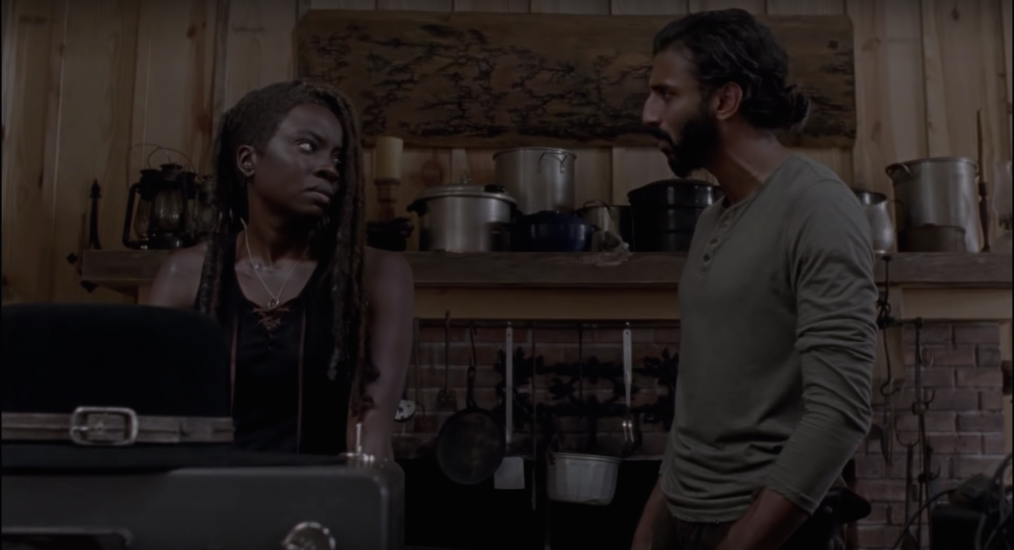
I also wanted to talk a bit about Dante. Did you know ahead of time that he was a Whisperer? If not, were you suspicious of his character?
I did. On the first episode Juan (Javier Cardinas) and I shot, Greg (Nicotero) and I both knew, and we weren’t sure if we should tell him. I don’t think we told him on his first couple days. He was just playing this lovable, goof-able doctor, and then we gave him the reveal that he has a secret. Interestingly enough, because Juan and I shared knowledge of his secret, that bonded us together a little bit closer as actors and characters.
Siddiq’s breakdowns in this episode were very hard to watch. They were hard to watch throughout the season, but this episode, especially so. How did you get into character for that intense, emotional stuff?
Oh, man. I do research and I do all this drama school s**t, but at the end of the day, it comes down to “trust” and it comes down to “play.” In this episode in particular, I put a lot of my trust into the hands of Michael Cudlitz, who unfairly gets to be a great actor and an equally great director. I did my work, but I knew I was in really safe hands and that he would help me flavor scenes so that the journey was there.
And then the “play” comes from who you play against, and The Walking Dead has incredible actors. Christian (Serratos) is very, very near and dear to me, not just as a person but also as an actor and a performer. In being able to share powerful scenes with her a lot of the pressure is taken off of me, because I know she’ll give and she’ll receive and I can just be present with her. I’m always wary of taking any of that credit, to be honest.
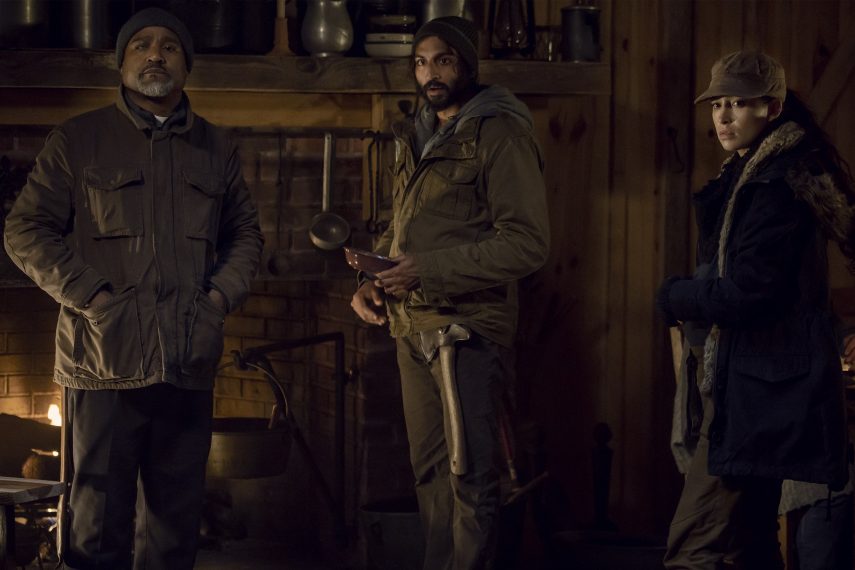
I noticed there seems to be some spider symbolism with Siddiq. There was the scene last season in the museum with the spider-covered walker, and then this season, there was the spider in the barn. Do you know the meaning behind that? Am I reading into something that isn’t there?
I think the spider is something that triggers him emotionally and that he’s quite scared of. In this season in particular, when he was in the barn and he was seeing these terrible things, he also saw a spider when he was in there. That only cemented parts of that memory.
Now, I’m not a writer, but you could also say that’s his subconscious realizing there’s a spider in their midst, who ends up being Dante. In his mind, the great tragedy is after they all fought back, when Alpha subdued them and lined them up, he thinks, incorrectly, he was frozen. So maybe part of the symbolism of the spider is that false, shameful memory where he thinks all he could do was be frozen and see the spider, when in fact, it’s the spider behind him that’s holding him down.
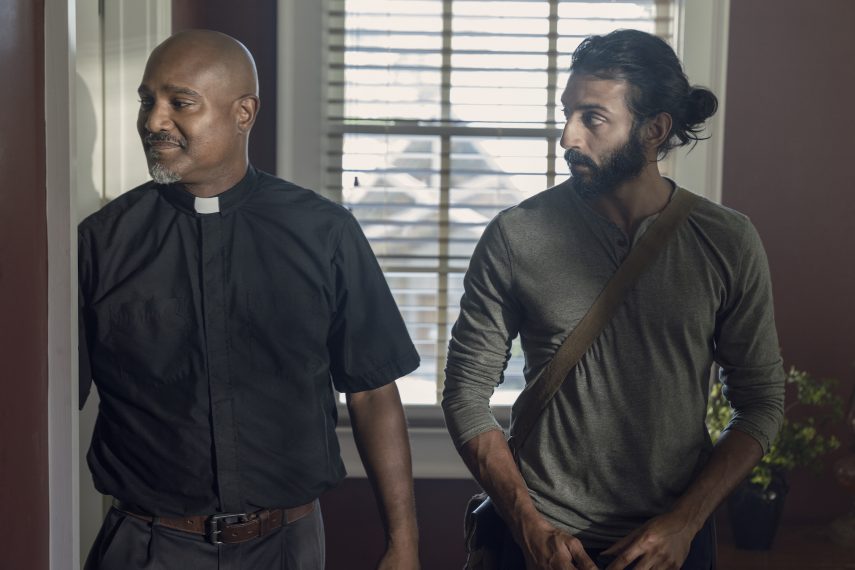
Some fans are probably going to be upset because Carl died for Siddiq, and now Siddiq is gone. What would you say to those fans who might feel like his death takes away from Carl’s memory?
I think it’s really important to remember this is a show called The Walking Dead, and eventually everybody dies. [laughs] We have to recognize it’s been eight years since Carl found Siddiq, and since then, he’s upheld his promise to honor Carl and Rick by extension; to try and live with compassion and mercy, and to create a better world. In Season 9, his mission was to bring the communities back together. In Season 10, he has a child. The ability to have a child in the apocalypse is unbelievable, and that’s not something they had imagined way back when.
So I would just say to the fans sometimes s**t happens, but Siddiq definitely stayed true to his promise of honoring Carl. Hopefully he’s been a character they care enough about and has been portrayed with enough sensitivity and depth that they will allow Siddiq to stand shoulder-to-shoulder with some of the other great characters, and they’ll give him a place up there with them, looking down on the rest of the survivors.
Do you have a favorite memory from your time on the show?
I have so many. This show, for me, was the first of so many things. It was the first time I worked with such a large ensemble. It was the first time I was ever on a show that has global reach the way this does, and met fans — well, first of all, met fans! [laughs] — let alone fans who care so passionately about our work and whom it affects.
When we had my death dinner, I insisted rather than everybody saying “goo goo-ga ga s**t” to me and going out for a fancy dinner, I wanted to show them my appreciation. So I cooked a big Caribbean feast, with jerk chicken and seasoned rice, and then I told everyone how much they meant to me and how much I cared about them. I said, “Look, I don’t want to hear anything from you. Let me just thank you.” That dinner encapsulated how much everyone and everything on this show has meant to me.
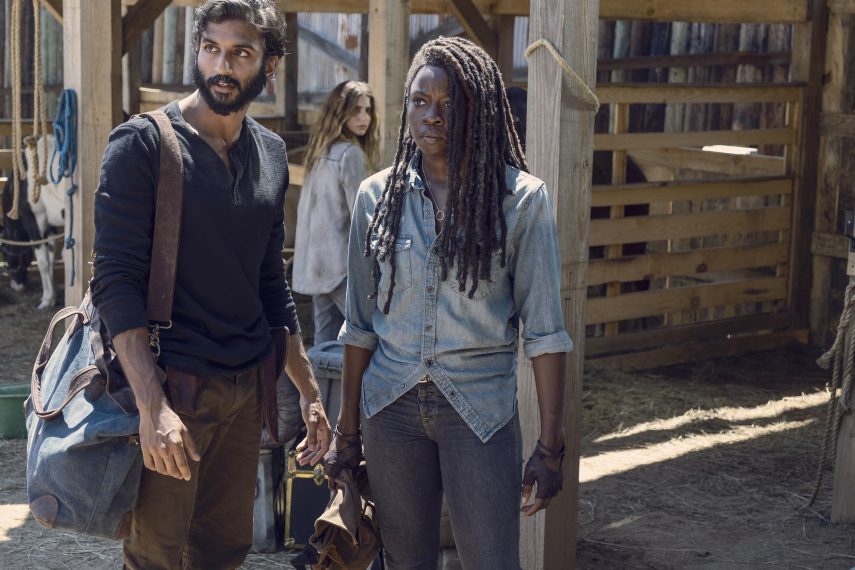
Was Siddiq Alexandria’s last doctor? Do they have no doctors now? Or did he train anyone else?
It’s been eight years, I’m sure he’s trained a lot of people. And I always remind everybody, this guy never finished medical school. I don’t even know if you can call him a doctor! I’m sure in eight years, with his drive to keep the communities together, he shared the knowledge he had. I’m sure they’ll be okay, in terms of medicine. Well, as okay as you can be in a world where there’s no more antibiotics, and you’re just dealing with roots and herbs.
What do you hope fans remember about Siddiq? And on the show, what do you think his legacy is for the people he cared about and the people he left behind?
I hope they remember him as a nuanced, compassionate character who underwent one of the worst tragedies the show has seen. Someone who saw something so terrible that he became a broken man. I hope they remember it was through his compassion and sensitivity to those around him that he was able to start crawling his way out of that hole, and ultimately, the tragedy is that somebody else took his life. He would’ve been okay.
The Walking Dead, Sundays, 9/8c, AMC
